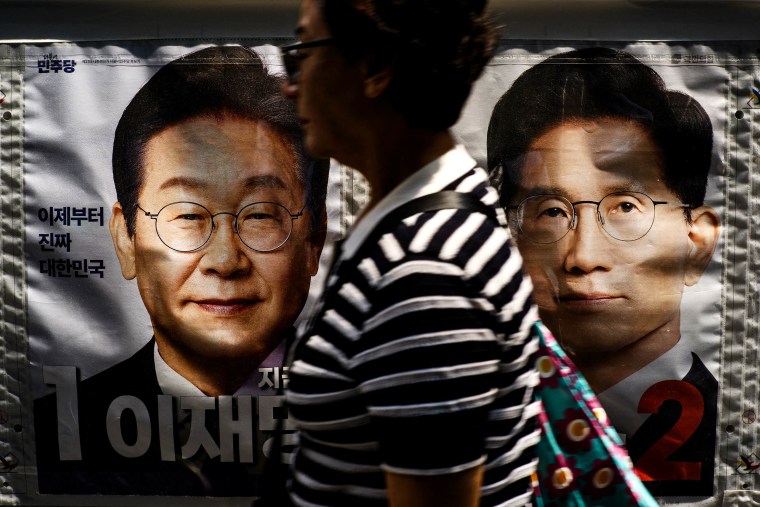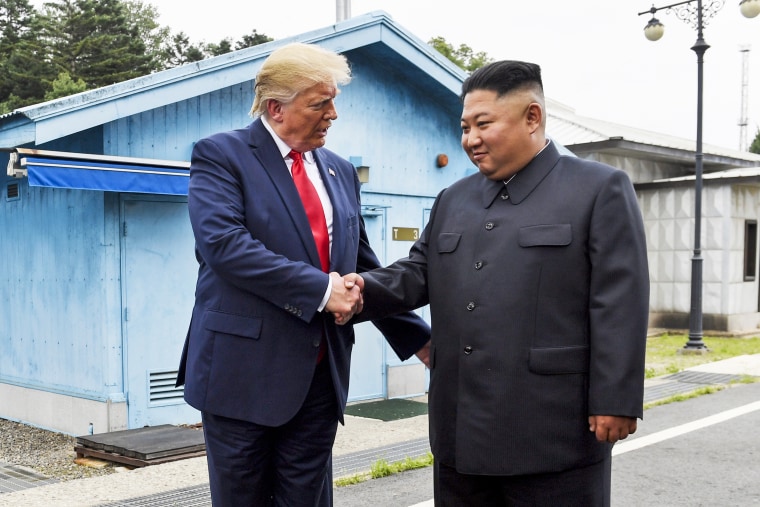-
Maps show U.S. air quality and Canada wildfire smoke forecast - 12 mins ago
-
Walmart Lays Off Employees in Three States: What To Know - 19 mins ago
-
State moves to suspend licenses of troubled L.A. nursing home companies - 28 mins ago
-
2025 Belmont Stakes: Post time, TV schedule, horses, post positions, updated odds - 45 mins ago
-
Employers added 139,000 jobs in May as labor market remains steady - 48 mins ago
-
Marijuana Bill Could See Edibles Outlawed in US: What to Know - about 1 hour ago
-
Michele Kaemmerer, first transgender LAFD captain, dies at 80 - about 1 hour ago
-
Phillies vs. Blue Jays Highlights | MLB on FOX - about 1 hour ago
-
A slice of the pizza business - about 1 hour ago
-
Trump Says Musk Wants to Talk After Explosive Public Feud – Report: Live Updates - 2 hours ago
The first task facing South Korea’s next leader: handling Trump
When South Koreans elect a new president Tuesday, it will end months of domestic political turmoil — but their choice could bring big changes to the country’s relationship with the United States.
Lee Jae-myung, leader of the liberal opposition Democratic Party, had a clear lead in polls going into the election, which is being held six months to the day after then-President Yoon Suk Yeol plunged the East Asian democracy of more than 50 million people into turmoil by abruptly declaring martial law.
Since lawmakers impeached Yoon in December over the short-lived martial law order, South Korea has been stuck in a leadership vacuum, churning through a series of acting presidents. The uncertainty has also constrained the U.S. ally in Washington even as President Donald Trump slapped it with a 25% “reciprocal” tariff, among other levies.
The presidential by-election, which was triggered in April when Yoon’s impeachment was upheld by South Korea’s Constitutional Court, promises a return to stability, and South Koreans have turned out in record numbers for early voting.
“A lot of people just want to move on, because it’s been a long six months,” said Jennifer Lee, a principal at the Asia Group corporate consultancy in Washington, who recently returned from a trip to South Korea.
Lee Jae-myung, 61, who narrowly lost to Yoon in 2022, has been seen as the most likely next president since Yoon was impeached.
But public support for Lee has been driven more by anger at Yoon’s conservative People Power Party, which has declined to condemn his actions, than by agreement with Lee’s policy positions, said Rob York, director for regional affairs at Pacific Forum, a foreign policy research institute in Honolulu.
“I don’t think enthusiasm for him is especially strong,” York said. “He’s not an especially inspiring figure for a number of reasons, but the conservative party is simply so tainted right now.”
Further boosting Lee’s chances is the fact that conservative votes are being split between Kim Moon Soo, the People Power Party candidate, and Lee Jun-seok, a young lawmaker from the upstart Reform Party who has been generating controversy with his antifeminist remarks.
Though Lee has moved toward the center during the campaign, he is generally seen as more open to China and North Korea than his predecessor and less friendly toward Japan, which is part of a trilateral security partnership with the U.S. and South Korea.

Because Yoon was “so pro-U.S. and hardcore U.S.,” it seems unlikely that the U.S.-South Korea relationship will remain as strong, the Asia Group’s Jennifer Lee said.
“I think that there will be some more balancing act between the United States and China,” she said, and if the Trump administration “comes out hard” on issues such as tariffs or cost-sharing for the 28,500 U.S. troops stationed in South Korea, “I think there may be a lot more frictions ahead.”
Still, Lee the candidate has expressed support for the U.S.-South Korea alliance and already begun reaching out to the Trump administration. In an interview last week with Time magazine, Lee said Trump “has outstanding skills in terms of negotiation” and that both he and Trump are simply looking out for the interests of their people.
Though he doesn’t align with Trump’s conservative views, Lee has in the past been nicknamed “Korea’s Trump” by supporters enamored with his populist, outspoken style.
Like Trump, Lee also survived an attempt on his life last year, having been stabbed in the neck during a visit to the city of Busan.
“Personality-wise I think the two of them, if they’re in a room together, would probably get along,” York said. “Both of them are people who view themselves as dealmakers, and I think they’re more concerned with crafting a deal that makes both of them look good.”
One of Lee’s top priorities will be reaching a deal on tariffs, which have hit South Korea hard. In addition to the 25% tariff, South Korea — the world’s 10th-largest economy — is vulnerable to steep duties on some of its biggest exports, such as steel and automobiles.

Lee is also facing a more assertive North Korea, whose leader, Kim Jong Un, has been advancing his ballistic missile and nuclear weapons programs. Like Trump, Lee favors greater engagement with the North, pledging last week to restore a military hotline between the two rivals, who technically remain at war.
Though Trump has said he’d like to revive his in-person diplomacy with Kim, North Korea appears far less interested in negotiating than it was when the two leaders met in 2018 and 2019. Kim is now receiving crucial economic and military support through a security partnership with Russia, and he said last year that North Korea is no longer pursuing reconciliation with the South.
The heightened tensions on the Korean Peninsula come amid reports that Trump is considering withdrawing thousands of U.S. troops from the South, an idea he also floated during his first term. Though Seoul says there have been no such discussions, Pentagon officials say a troop reduction has not been ruled out.
Neither South Korea nor U.S. Forces Korea (USFK) were barely mentioned in Defense Secretary Pete Hegseth’s speech in Singapore last weekend laying out the U.S. approach to the Indo-Pacific, adding to concerns about where the country stands with Washington.
“The U.S. can unilaterally decide and act on reducing USFK troops. It’s their military, after all,” said Bong Young Sik, a North Korea specialist at the Yonsei Institute for North Korean Studies at Yonsei University in Seoul, referring to U.S. Forces Korea.
But “they need to consider and accommodate the situations their security partners are under and facing,” he said.
“If they go with ‘What is good for the U.S. is good for the world,’ I am not sure how long that approach could work,” Bong said.
Jennifer Jett reported from Hong Kong, and Stella Kim reported from Los Angeles.
Source link































